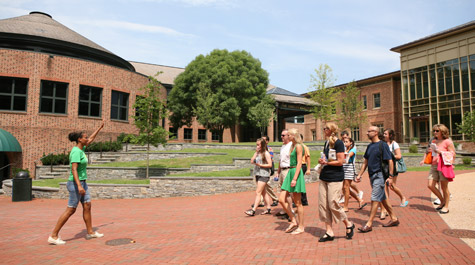In my four years at the College of William and Mary, one annual event has never ceased to confuse me. No, it’s not Yule Log — come on, it makes perfect sense to stand in the cold while a man dressed like Santa Claus reads us a children’s book. Nope, it’s definitely not the call for room reservation deposits — seriously, who wouldn’t want to pay $200 to the College directly after the holidays? Tired of guessing? For me, the most confusing annual campus event is the Student Assembly election. I totally understand the treasured democratic process of casting my equal vote to welcome a new leader, but certain trends and traditions about this event sincerely puzzle me.
To begin, the campaign materials for each presidential and vice presidential pair are quite odd. Why does each pair commission a professional photographer to take these model shots of them for their posters? Some of these pictures seem like they belong on the cover of “Vanity Fair” rather than on campaign material for a university election. This is the same campaign material that will likely get pinned to some wall in Millington and never be seen again.
What I’m saying is, what’s the point of this fancy photo trend? I want to see your personalities in campaign photos. Show me your best mirror selfie, or maybe what you look like leaving Earl Gregg Swem Library at 2 a.m. I’m not sure when this trend of posing by trees and squirrels in business casual attire became a thing, but I’m over it and ready for something new. If you’re going to use photography to promote yourself, let us see a balance of semi-professional and semi-personal you.
I am also very confused how each pair of candidates convinces their friends to change their Facebook default pictures of these aforementioned professional headshots. I can barely convince my friends to follow me on Twitter, let alone make my face their Facebook default for weeks. Do the candidates promise them something in return? Or is this purely the ultimate display of love and loyalty? Is this a prime example of the millennial generation’s use of “Facebook politics”? Does love on Facebook translate to love at the ballots?
These are questions which consistently cross my mind during SA elections, and I would like answers at some point. I’m not saying there’s anything wrong with this current system; I just think it’s something we all do without questioning why we’re doing it. The only true downside of this trend is the decision your friend has to make if you lose the race: should your friend take down your photo and accept the defeat, or keep your photo up to show support and solidarity? This is a lose/lose situation either way and one that I imagine is very awkward for the friend. Truly, all that the Facebook default pictures tell me is that this person is a friend of the candidate. It doesn’t make me want to vote for said candidate or change my opinion of the candidate in any way.
Finally, on the last day of the election, each pair of candidates stands side by side on the terrace in an attempt to have some final small talk with those passing by, a tradition that is intimidating for an awkward student like me. I understand that if one team is already out there, you have to match their enthusiasm for meeting students – that’s common sense. What I don’t think the candidates realize is that this puts a lot of pressure on students who dread small talk. Even more uncomfortable is that passersby are put on the spot and made to decide which pair of candidates they’re going to speak with. I’m aware that I’m turning this friendly situation into an overly dramatic scene written by Shonda Rhimes, but it’s all about perspective.
I’m not a political scientist or a campaign manager by any means, but I do believe it’s interesting to consider what factors make SA candidates more or less appealing outside of their platforms. Clearly, each pair of candidates ascribes to the same model of how to win votes. I wonder if we could push the boundaries and change this structure on our campus. We’re in something of a social bubble on campus; we can test new ideas regardless of the dominant model of politics where image and personality trump ideas. If you take my advice, run for office, and subsequently lose, please remember that I’m just a liberal arts student with ideas, not a professional.

